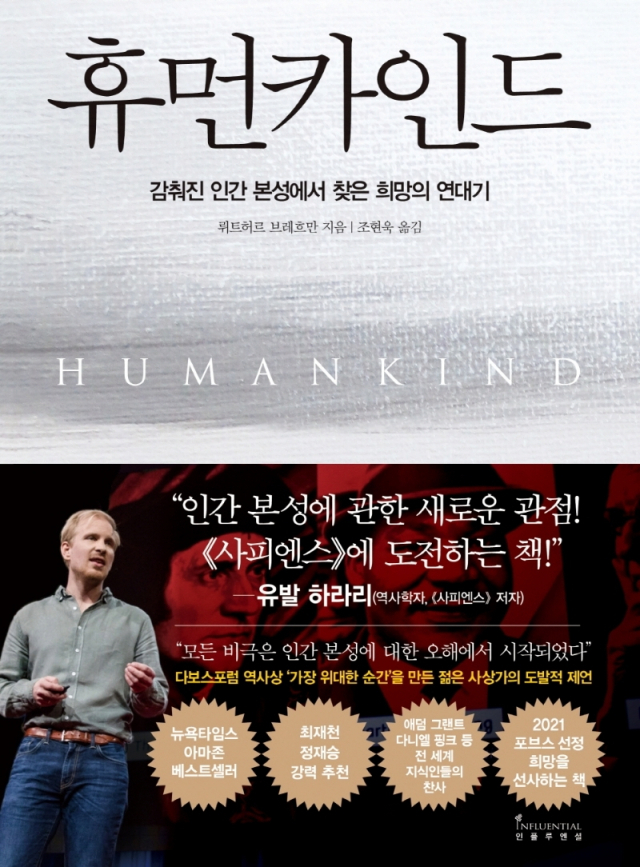‘Human goodness’ can fundamentally change our society
Humankind/Ludher Brechmann
World War I and II, the sinking of the Titanic, etc.
People help others and the weak while dying
Social systems, etc. give birth to negative and pessimistic humans
Human solidarity and cooperation must be restored only when good awareness is restored
Senior Reporter Dal-Sik Jeong [email protected]
Input: 2021-02-25 17:27:32Revision: 2021-02-25 17:34:19Published: 2021-02-25 17:34:34


 sign.” />
sign.” />
<휴먼카인드> sign.

A scene of the Stanford Prison Experiment by Professor Philip Zimbardo, a social psychologist in the basement of Stanford University, USA. Source Philip Zimbardo. Influencial offer

German soldiers celebrating Christmas in trenches during World War I. Source Getty Images. Influencial offer
People who ignore the quarantine rules because of the profits in front of them in the global crisis of Corona 19, and angry crowds from abroad who commit looting crimes in a blocked city… . Every day we come across news full of terrible violence and human selfishness. Looking at this alone, we have the idea that human nature is inherently selfish. Sunja, who once argued for’vocalism’, said, “If human nature is good, how would the world look like this?” said, “When young children quarrel with each other over a snack that they will eat, the human nature is extremely selfish and lustful. It is to show”.
In 2020, when the report on the mask wave was in full swing, various relief waves continued, including the amount of the’fruit of love’ raising a record high. In addition, outside of the news that was highlighting the terrible abuse of children, 400,000 citizen petitions followed by requesting fundamental legal reforms to prevent the recurrence of the’Jung Ini case’. As a result of a study of more than 700 disaster sites since 1963 (Disaster Research Center at the University of Delaware, 2006), surprisingly, crime rates such as murder, robbery, and rape have decreased during disasters, and altruistic practices of sharing and distribution have increased. . Mencius, who insisted on the theory of’seongseon’, said, “When I see a child drowned in water, I try to save a child even though no one told him to do it, and this is the nature of good that only humans have.”
I am confused which figure is human nature. However, one of the most noted thinkers in Europe today, Ruudher Brechmann (the Netherlands), ends this debate with a single sword and raises the hand of Mencius who says that’human nature is good’. The author is <휴먼카인드>Argues that the universal attribute of mankind, that is, human nature, is good. It also emphasizes that if we take that good nature seriously, that goodness can radically change society.
First, the author comes out with evidence that human nature is good. In the first and second world wars, the sinking of the Titanic, and the 9/11 terrorism, people claim that they have helped others and the weak without failing to die. It also specifically proves that humans are overwhelmed by’good nature’ rather than falling into’crowd mind’ and panic at the moment of crisis. In short, the peace of Christmas (truce) in December 1914, the time of World War I, is representative. Two-thirds of the British front, facing the Germans at the time, stopped fighting on Christmas Day. Most of that, too, by the German army’s proposal. The miracle of “Christmas Peace” was also during the Spanish Civil War, the Boer War in South Africa, the American Civil War, and the Crimean War.
However, the author points out that although humans have good nature, our political and economic systems, knowledge, and worldview are all operating based on cynical, negative, and pessimistic views about humans. At the same time, paying attention to the fact that the pessimistic perception of human nature is the origin of all tragedies such as inequality, hatred, and disbelief in our face, it unearths various evidences of the good nature of humans with extensive historical records. For example, it is the Stanford Prison Experiment by Professor Philip Zimbardo, a social psychologist. The reality of this experiment is completely different from what we are familiar with in psychology textbooks and the like. In psychology, 18 students who played the role of prison guards and prisoners said that when they encounter the negative environment of prison, they commit harsh acts and fall into hysterics, and inhumanly change them. However, various records and transcripts from the Stanford University Zimbardo Archives show that the’required characteristics’ that the professor leads the students in the experiment according to the experiment intention was outright in this experiment. Another novel by William Golding about the dark abyss of man <파리대왕>In order to refute this, the author sometimes finds a case that is contrary to the actual novel. In 1965, six boys isolated for 15 months on the uninhabited island of Ata in Tonga, Polynesia, did not quarrel with each other like a novel, but had all the necessary things for life, and formed a peaceful and ideal society.
The author warns that when people fall into the big frame of’human nature is selfish’, they themselves will fall under the control of power. On the other hand, if we regain recognition that human nature is good, we say we will achieve solidarity and cooperation that we have never imagined. He emphasizes that this is the most realistic and only way to save the crisis for humanity trapped in inequality, hatred and distrust.
Book It expands our view of human nature and makes us rethink all conventional ideas. It is a’bamboo of insight’ that seems to have been beaten in the back of the head. Written by Lutzer Brechmann/Translated by Hyunwook Cho/Influencial/Page 588/22,000 won.
Senior Reporter Dal-Sik Jeong [email protected]
